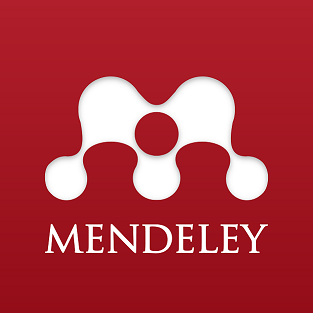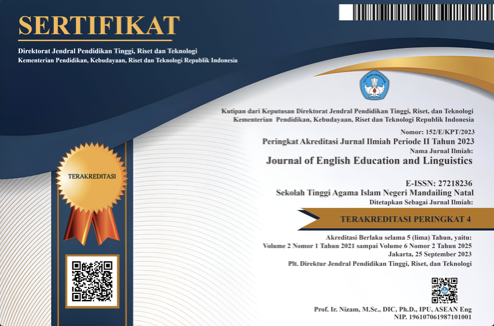IMPROVING STUDENTS' SPEAKING SKILL THROUGH DEBATE
DOI:
https://doi.org/10.56874/jeel.v2i1.396Abstract
Speaking is one of the important skills in language learning. Speaking is the act, utterance or discourse of one who speaks. It also can be defined as an activity in giving and asking information as if dialoguing by two or more people. In speaking, there is a process of communication between speaker and listener. People put ideas into words, talking about perceptions and feeling they want other people to understand. The writer observed that most students are difficult to put ideas into word through communication in speaking English. To solve the problem, the writer conducted classroom action research, by implementing debate. The writer applied two cycles in this research. Each cycle consist of three meetings. The participant of this study was one class consists of 32 students. The instrument for collecting the data was speaking test, observation sheet and document. Based on the research result, showed the progressive mean of the students. The first meeting was 46,87, second meeting was 50,09, third meeting was 60,28, the fourth meeting was 65,12, the fifth meeting was 73,56 and the sixth meeting was 77,81. So, the mean in the second cycle was higher than the first cycle.It is indicated that the application of debate technique improve students’ speaking skill.
References
Aristy, I., Hadiansyah, R., & Apsari, Y. (2019). Using Three Step-Interview to Improve Students’ Speaking Ability. Project: Professional Journal of English Education, 2(2), 74-79.
Arung, F. (2016). Improving the Students’ Speaking Skill through Debate Technique. Journal of English Education, 1(1), 70-76.
Baso, F. A. (2016). The Implementation of Debate Technique to Improve Students’ Ability in Speaking. Exposure Journal, 5(2), 154-173.
Brown. H. Douglas Principle of Language Learning and Teaching, (New Jersey: Prentice Hall, 2000)
Fauzan, U. (2014). The Use of Improvisations Technique to Improve The Speaking Ability of EFL Students. Dinamika Ilmu, 14(2), 264-287.
Fauzan, U. (2016). Enhancing Speaking Ability of EFL Students through Debate and Peer Assessment. EFL Journal, 1(1), 49- 57. http://dx.doi.org/10.21462/eflj.v1i1.8
Freely, Austin J. &David L. Steinberg, Argumentation and Debate, (USA: Wadsworth Cengage Learning, 2009)
Harmer, J. (2007). The Practice of English Language Teaching. England: Pearson Education Limited.
Iman, J. N. (2017). Debate Instruction in EFL Classroom: Impacts on the Critical Thinking and Speaking Skill. International Journal of Instruction, 10(4), 87-108.
Junaida, R., & Prastiyowati, S. (2018). Enhancing Students’ Speaking Ability at 10th Grade of Computer and Network Engineering Class at SMKN 4 Malang through L1/L2 Based Strategies. Celtic: A Journal of Culture, English Language Teaching, Literature, & Linguistics,3(1), 56- 71. https://doi.org/10.22219/celtic.v3i1.7859
Krieger, D. (2005). Teaching Debate to ESL students: A six-class unit. The Internet TESL Journal, 11(2).
Nunan, David, Practical English Language Teaching, (New York: Mc. Grown- Hill Companies Inc, 2003)
Downloads
Published
Issue
Section
License
All articles published in the Journal of English Education and Linguistics are licensed under a Creative Commons Attribution-ShareAlike 4.0 International (CC BY-SA) license. This means anyone is free to copy, transform, or redistribute articles for any lawful purpose in any medium, provided they give appropriate attribution to the original author(s) and Journal of English Education and Linguistics, link to the license, indicate if changes were made, and redistribute any derivative work under the same license.
Copyright on articles is retained by the respective author(s) without restrictions. A non-exclusive license is granted to the Journal of English Education and Linguistics to publish the article and identify itself as its original publisher, along with the commercial right to include the article in a hardcopy issue for sale to libraries and individuals.
Although the conditions of the Creative Commons Attribution-ShareAlike 4.0 International (CC BY-SA) license do not apply to authors (as the copyright holder of your article, you have no restrictions on your rights), by submitting to the Journal of English Education and Linguistics, authors recognize the rights of readers and must grant any third party the right to use their articles to the extent provided by the license.

This work is licensed under a Creative Commons Attribution-ShareAlike 4.0 International License.








